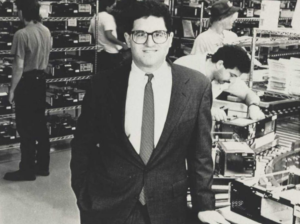Some entrepreneurs do more than start a business—they revolutionize an industry. Such was the case with young Michael Dell, founder of Dell Inc. From a young age, Michael Dell exemplified the innovative spirit of a budding entrepreneur, finding problems and solving them in unique ways. Through his entrepreneurial endeavors as a teenager and young man, Dell became a major figure in modern history. Specifically, Dell’s innovation in the computer industry played a critical role in the reshaping of the modern personal computer market.
At age 15, Dell bought his first computer, an Apple II—one of the first personal computers available at the mass level—for the purpose of disassembling it to see how it worked. Dell’s intrigue with computers did not end here, however. In 1983, Dell began studying pre-med at the University of Texas, in accordance with his parents’ desire for him to become a doctor. In his freshman year, Dell further cultivated his interest in computers by repairing and upgrading his fellow students’ computers. Before long, Dell’s dorm-room business venture had morphed into something far greater than a hobby. Dell noticed a tempting gap in the computer industry at the time. While people were beginning to use personal computers, nobody was selling them directly to the consumer. Computers were being sold indirectly to consumers through a middleman, creating an un-personalized and unnecessarily expensive market. Dell stepped into this hole by offering customized PC computers at a fair price directly to consumers. The success of Dell’s somewhat simple innovation was immediate. In his freshman year alone, Dell made approximately $80,000 of profit. At age 19, he dropped out of school and began to work full-time for his company, PCs Limited. Within a single year, Dell accumulated a staggering $6 million in sales revenue. After beginning sales over the web in 1996, Dell’s company—by this time renamed Dell Inc.—averaged above $1 million in sales every day. By 2001, Michael Dell was a billionaire who employed over 35,000 people.
 Michael Dell at 24
Michael Dell at 24
AP Photo/Rebecca McEntee
Michael Dell’s entrepreneurial pursuits did not begin in college. Dell was characterized by a strong work ethic from a young age, obtaining his first job at age 12. In high school, Dell created an innovative newspaper subscription service, making $200,000 in profits in the first year. Dell’s success as a young entrepreneur was driven by a strong customer-first mentality. He looked for ways to deliver a high-quality product with an outstanding customer experience. As he would later go on to say, “At Dell, we believe the customer is in control, and our job is to take all the technology that’s out there and apply it in a useful way to meet the customer’s needs.”
Dell’s innovation in the computer market changed the way people thought about and used personal computers. Instead of computers being mass produced by manufacturers and sold indirectly to consumers through salesmen, computers were sold directly to consumers, who were able to customize how they wanted their computer assembled.
Young Michael Dell personified successful entrepreneurship—when he saw a problem, he did what he could to solve it by offering customer-oriented, innovative solutions. What began as a small business in a college student’s dorm-room was transformed into a global business that has served millions of customers. As Dell said, “You don’t have to be a genius or a visionary or even a college graduate to be successful. You just need a framework and a dream.” Dell’s example is an inspiration to young entrepreneurs today. As a young man, he spotted potential problems and sought ways to fix them. Though certainly not every entrepreneur will be as successful as Michael Dell, young entrepreneurs can learn from his example and apply these lessons to their own pursuits.

Michael Dell is forever marked as an influence to the world with what he did. Taking out the middleman and prioritizing the customers is such a drastic innovation in that realm. Imagine how the world would be now without such an improvement… a lot more expensive! Also, his hard work in the newspaper industry definitely played a role in how he viewed consumers in the computer industry as well.